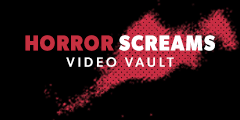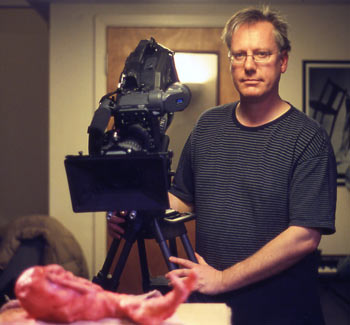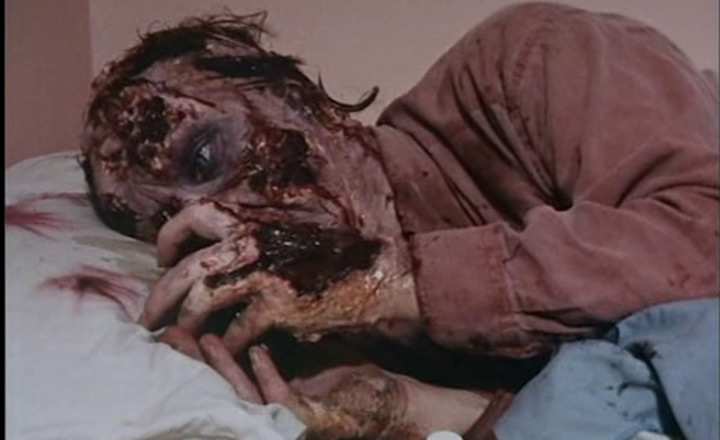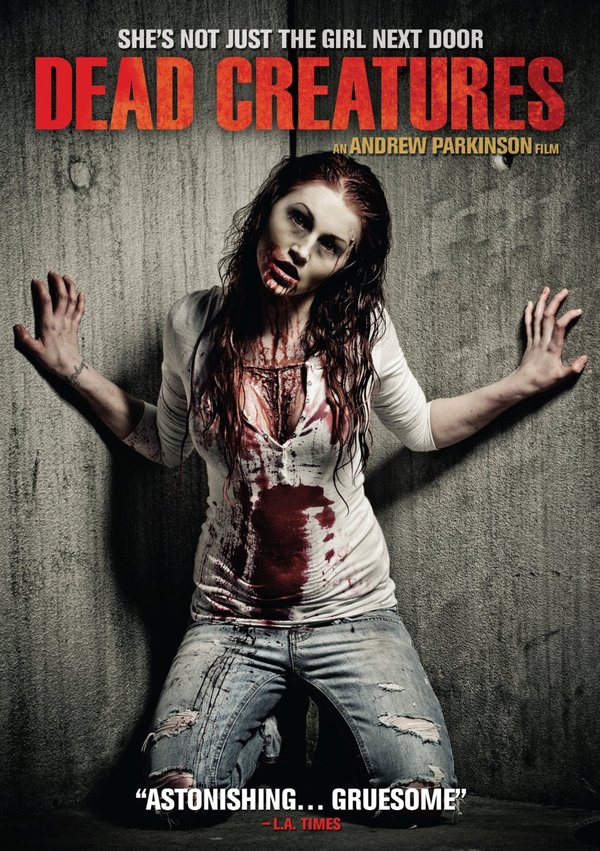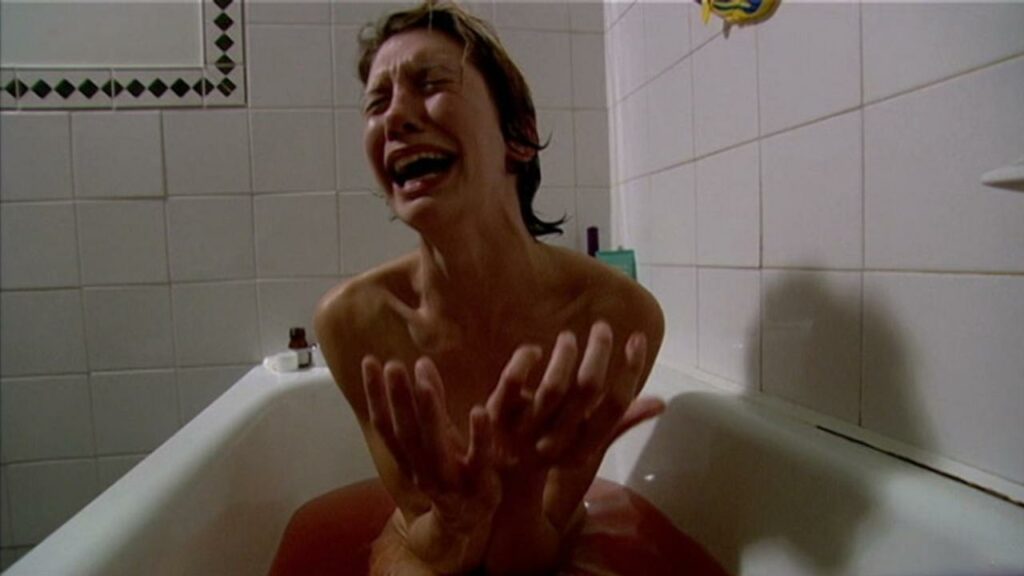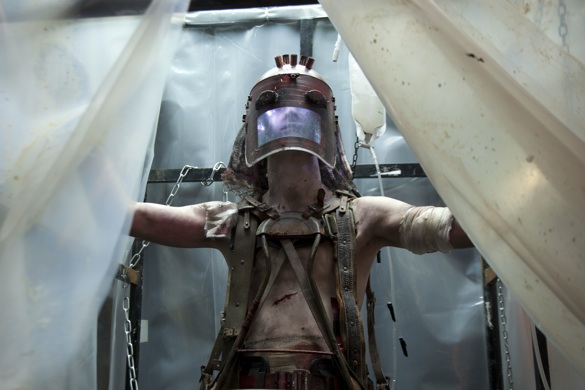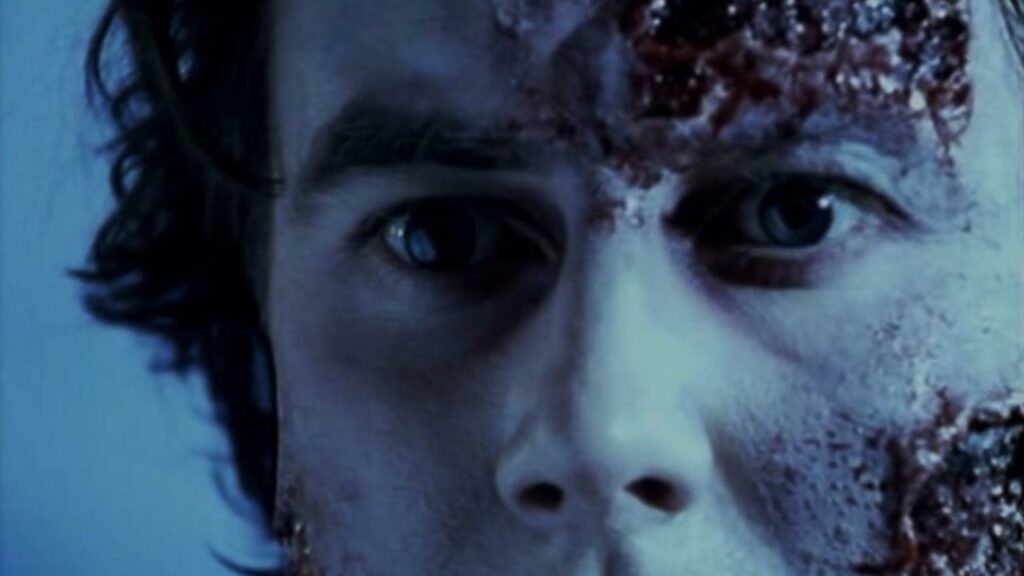How did you first get into film making?
Ive always messed around with cameras as much as I could afford, I made a few short films in my 20s. I got a tecchy job at the BBC at the start of the 90s and joined the film club and theatre club. Gradually I started to mix the two.
A tough question but what has been your favourite film to work on?
I, Zombie. It was the first ‘real’ film I produced and directed. It was a long messy process, but I was working with lots of friends who were tolerant of my bumbling, and were learning along side me. We had a good time and made an ok film.
What is the hardest part in your opinion of film making?
Really, its all hard. Finding an idea thats going to work on a budget is not so easy. Practically it used to be getting enough money to buy film stock. Now the game has changed and everyone has an hd camera. Now its hard to stand out from the much larger crowd.
Who would you say has been your biggest influence on your career?
I always loved Romero, Cronengerg and Lynch. But it was when I saw Tetsuo and Necromantic, low budget films with a real punch I started to think I had a chance.
The use of documentary style talking head interviews and the attention to authenticity in I Zombie feel ahead of their time. We’ve had a lot of found footage zombie movies since it came out from Diary of the Dead to Zombie Diaries. What prompted you to take this approach?
An earlier edit of the film wasnt well and I was lost for what to do next. Id alwayd loved the way Woody Allen would use interviews with his characters in his early films, so thought Id give it a try. It really unified a disjointed edit.
I Zombie got some very good reviews, one memorably likening it to a zombie themed Ken Loach movie. What were your main influences in regard to its dreary everyday look and feel, dominated by Oxfam shops and unpaid gas bills?
That was my dreary everyday life! I only had accesss to run down flats and old cars, so I just used my stuff. It was the only avenue open to me.
Giles Aspen is terrific in the lead, and in fact all the acting helps add to the realism. Tell us more about how you got I Zombie financed, cast and completed.
Giles was terrific, I was very lucky he was interested in being involved. I funded the film, which meant paying for the film stock, lab and a few sandwiches. No one was paid, we all did it as a hobby.
I cast it mostly from a theatre group Dean Sipling, one of my mates was involved with. I used to help out with lighting, so we all used to hang out together. It was really useful because I could see how people behaved and who could act. I wouldnt have known how to audition someone.
It was completed thanks to my insane dogged determination..
The humanisation of a zombie character as he deteriorates physically and mentally had never, as far as I know, been captured in this kind of detail before though sympathetic zombies like Bub in Day of the Dead and the agonised half lady zombie in Return of the Living Dead are strong precedents. What were your key influences in relation to Giles’ character arc? Was the idea always to present his transformation as, ironically, the only thing that finally gives his aimless existence some sense of focus?
I knew I wanted to make a slow moving tale of hopeless despair. I Zombie was the only viable script idea I had that would allow me to make that film, and because it was a zombie film, there was a small amount of commercial potential. Because its from his POV, It allowed the shifts in tone and style. His transformation, or illness is is so overwhelming, his lifestyle is just managing it and living with an uncertain future.
You did the melancholic music for I Zombie and have scored all of your subsequent features. Tell us about the challenges of creating the music for thematically and stylistically unusual horror films like yours.
Its probably the easiest part of the film, certainly the most relaxed. Just me a guitar, a keyboard and an 8 track. Then I’d work with Tudor Davies my regular sound man, who would replay the more difficult keyboard parts properly, then mix it.
Dead Creatures was shown at Sitges and Fantasia and, like I Zombie, ended up with US distribution via Fangoria Fllms. How was the experience of getting both films released, and how did the Dead Creatures production process differ from its predecessor?
It was messy and difficult, partly because I didnt know what I was doing, partly because there was no prescident, it was early days for independent film. There was no one I could talk to who’d done it. With I, Zombie, the internet was embryonic, people were still producing xeroxed fanzines. The big new format was DVD! It went out on VHS in the UK.
Dead Creatures was tough and expensive to make. It was the first time Id cast people who werent friends, so there was a different dynamic, certainly less fun. Also we shot on 35mm film which meant big heavy cameras, not so easy to throw around.
Dead Creatures is, like I Zombie, another dialogue driven, idiosyncratic take on familiar genre tropes, including the sadistic Van Helsing like older “hunter” character. Did you conceive it as a companion piece to I Zombie?
Yes, It was set in the same world of sentient zombies, not just zombies who lurch around looking for ‘brains.’ After having done an character study, It seemed like a natural progression to look at a broader group of people.
Very real disease metaphors run through your work, with specific nods to cancer and AIDS in I zombie, Dead Creatures and Venus Drowning. This recurring theme and some of your more visceral imagery has some echoes of early Cronenberg but feels very much distinctively your own. Where does this fixation come from? What are your own preferences when it comes to horror films?
I certainly enjoy most horror films, even the daft, fun ones. The ones that really resonate with me are the more uncompromising and realistic ones. Most of the horror films up until the 60s were costume dramas, particularly with Hammer. In the 70s, social realism became the norm, and for me it really ramped up the intensity.
Although well reviewed and considered your most technically assured and ambitious film to date, Venus Drowning remains unreleased. What happened and what other challenges have you had in terms of getting your movies seen?
‘VD’ as I like to call it, was a thoroughly enjoyable film to make, mostly down to Jody Jameson the lead actress. It was told from her fractured perspective, and as such was really difficult to edit and finish. It was a hard sell for the distributors because it lacked the zombies and the buckets of blood from my other films.Also, by the time it was finally finished I was just burned out, and had to go back to my day job and make some cash.
How did you come to be involved with Little Deaths? Mutant Tool is your most hallucinatory and bizarre work to date, what was the experience like to be part of a feature anthology?
I was socialising with Sean and Simon the other directors at the time. I didnt want to do another feature at the time – my daughter had just been born, so an anthology seemed like a good compromise. It was exciting but frustrating to work on. We agreed with the pruducers to make a hard core horror film. On paper they liked mine, but when they saw a roughcut with a giant penis ejaculating halluciogenic sperm, it was way too much for them. They took the film and recut it, minimising the graphic content that was central to the idea and reducing the visual impact.
Have you been working on any projects since Little Deaths if so can you tell us any details?
I’ve contributed post production work to friends films, but after all the fighting and falling out on Little Deaths Id had enough. I loved the production value that came with the budget, but the fighting took the joy out of it. I have various ideas and projects I kick around and almost go for it, but I have a family and mortgage to worry about..
What are your thoughts on the current state of the horror genre, both in its mainstream guise and the independent scene?
Its mostly pretty healthy. The indy found footage films are everywhere and are mostly quite appealing as the low budget aesthetic works well. The mainstream is generally pretty conservative, maybe too much.
As both I, zombie and Dead Creatures feature a different take on the usual undead brain munching zombie theme what made you decide to take that angle?
I didnt just want to be another Romero copyist, and the idea of sentient zombies seemed so much grimmer. I like grim.
What were the budget restraints on I,zombie and how did you achieve the effects?
There was little or no budget – it was what I had in my pocket. That was the appeal of having one zombie. One central character in makeup. I rang around makeup schools to see if there were any students looking for work experience and met Paul Hyett who was teaching prosthetics. He was just great and did some amazing work on the film. Hes now well established as a major spfx talent and is directing his own films.
Are you a fan of zombie movies yourself if so do you have a favourite?
Everyone is a fan of zombie films! Its a toss up between Dawn of the Dead and Zombie Flesheaters.
Thank you very much for your time and we hope to see more of your work soon.
Thank you!
Interview by Peter ‘Witchfinder‘ Hopkins
I, ZOMBIE: THE CHRONICLES OF PAIN
